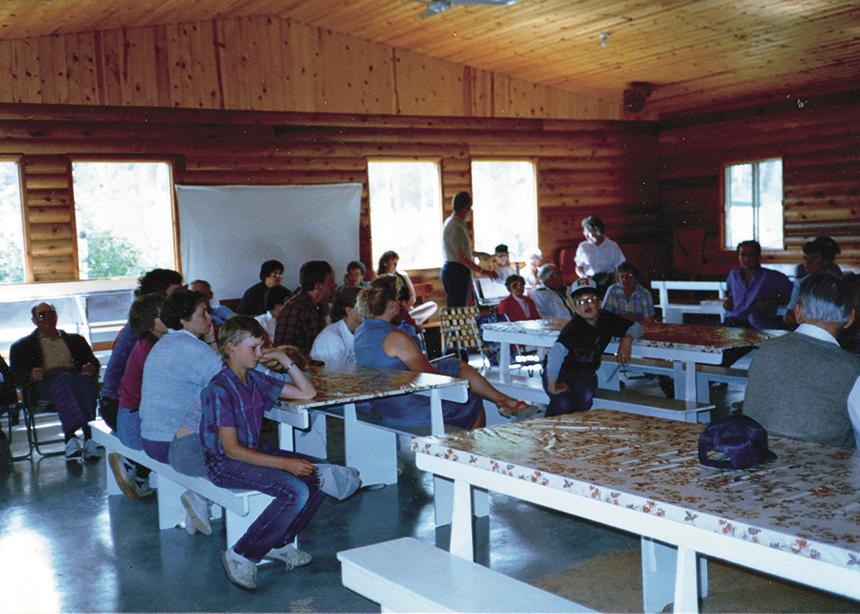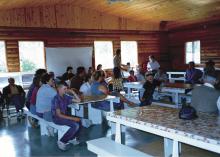“People used to work at camp because it was the right thing to do. They’d say things like: ‘I’d work 18-hour days, was paid very little, never got breaks, took care of kids and had the best time of my life, it was great!’ But that’s less motivating now.”
These are the words of Tim Nickel, a Saskatoon-based consultant hired by Mennonite Church Saskatchewan to perform a months-long, in-depth study of its three camps: Camp Elim, Camp Shekinah and the Youth Farm Bible Camp.
Terry Stephaniuk, MC Saskatchewan’s moderator, emphasizes that there was “no agenda” attached to this study; it was simply an opportunity to learn more about the camps, and gather feedback from constituents to help guide decisions and future planning. MC Saskatchewan approved $25,000 for the study although the final cost is not known yet.
The framework of the study has four main parts:
- Nickel performed an organizational review of each camp;
- Held a stakeholder analysis with the key informants of the camps;
- Talked to other camps in the area to learn how they are organized, funded, and governed; and
- Hosted community conversations with MC Saskatchewan congregation members.
Finally, Nickel will offer a discernment presentation to MC Saskatchewan Council.
“I’ve been talking to tons of people about these camps, and with tons of MC Saskatchewan people,” he says. “While each camp is governed by its own board, MC Saskatchewan owns the camps. The camps are huge assets with a huge impact, but that also means huge liabilities.”
Five community conversations were held; three in-person events and two online events. At each conversation, Nickel presented an in-depth history of each camp, including their revenue streams and governance structure, as well as unique features and challenges. Those attending the conversations were given a chance to ask questions, offer feedback, and share their own stories of how the camps have impacted their lives.
Nickel says that the study thus far has shown that “people still feel a moral obligation towards our camps. It’s a matter of identity, there’s an ownership piece in this. A real sense of identity lies at MC Saskatchewan with the camps . . . [but] there’s a tension though. The question of ‘Does the constituency identify with the camps as a whole, or is it individual camp loyalty?’”
As the landscape of the Mennonite church changes across Canada, this inevitably impacts Mennonite camping ministries. The camps were originally created to help with Anabaptist faith formation in children and youth.
One historical account of the camps that Nickel came across said that the camps served “to impress upon the youth that the grass isn’t greener in other places.” At present, only 25 percent to 30 percent of kids attending camps are from MC Saskatchewan churches; most campers are not and many don’t attend church at all.
All three of the camps have stable revenue streams at present, but drawing young adults to work at camps for the summer is a significant challenge. Aging congregations have fewer and fewer kids to send to camp, which impacts the camper-to-counsellor-in-training-to staff pipeline, says Nickel. Still, people at the community conversations shared about the personal impact that camps had on their lives.
One person said, “We get these non-church kids for a week. We want to be very careful to give them love and God.”
Another said: “Parents have a right to share their faith, and a child has the right to autonomy. Camp might be a place for kids to be loved and accepted for who they are. It’s a very redeeming opportunity.”
Still, the big question hanging in the air was verbalized by Armin Krahn at one of the consultations: “Saskatchewan is too small to have three camps, so what do you do?”
Nickel offered four options of how the regional church could move forward with its camps:
- It could own and operate the camps, and employ the staff;
- It could own the camps, but delegate governance and operations to the individual camp boards;
- It could contract and lease out governance to an outside organization, such as One Hope Canada, but maintain ownership; or
- It could sell the camp properties, and then rent or sell them back to the individual camp boards.
The MC Saskatchewan council will consider these options when Nickel presents his findings.
“MC Saskatchewan is ultimately in charge of the camps, which is so much responsibility,” Nickel says. “Does MC Saskatchewan have the ability to do this well? There’s a real tension between ‘oh, it’s just camp, it’s a good thing’ versus so much responsibility and the need to mitigate risk. There are no easy answers, and yet the status quo is just as hard.”




Add new comment
Canadian Mennonite invites comments and encourages constructive discussion about our content. Actual full names (first and last) are required. Comments are moderated and may be edited. They will not appear online until approved and will be posted during business hours. Some comments may be reproduced in print.